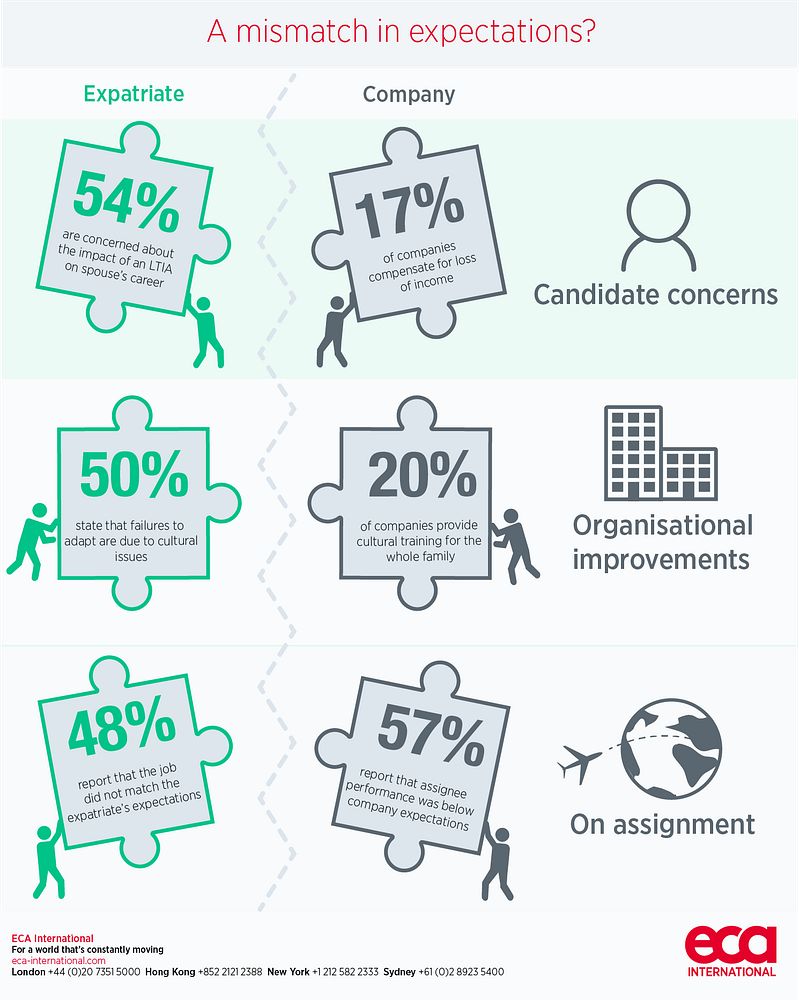Blog post -
Managing international assignments for the modern expat
In our recent ‘The decline of the traditional expat?’ article we looked into the extent to which the traditional expatriate socio-demographic profile and remuneration package had changed over the last 20 years. We found that sending employees to work overseas was more popular than ever before, but that there had also been some significant changes to the demographics of the typical assignee profile.
In this article, we look into the trends that our latest Managing Mobility Survey 2016 has revealed and discuss how companies can best overcome some of the barriers to sending employees on international assignments.
A brief summary of the main characteristics from our previous surveys
| Typical 'expat' employee of the last century | Typical expat profile of today |
| Male | Male |
| Aged 35 - 50 | Aged 35 - 50 |
| Western European/North American | Now as likely to be Asian as Western |
| Accompanied by a wife and children | Accompanied/unaccompanied |
| One-off 3 year assignment | Likely to be short-term, commuter or long-term |
| Managing a local operation | Managing a local operation/career development |
Previously, we discussed how the demographics of the typical expatriate employee had changed, as shown in the infographic above. We mentioned that Asia was just as likely to be a source of expatriates as Western Europe and North America. There had also been a major shift away from one-off 3-year assignments to shorter term and commuter assignments, with fewer being accompanied by families. Finally, we saw companies increasingly utilise international assignments as career and talent development programmes, although managing local operations was still the main purpose of these assignments.
Latest findings from our Managing Mobility Survey 2016
Our latest Managing Mobility Survey 2016 focussed on discovering the main challenges and barriers that companies find inhibit the success of their long-term international assignments (LTIA’s). It also gave key insights into the current measures that organisations employ to overcome them. Many of the key findings supported the trends found in our previous surveys alongside numerous other fascinating developments.
In terms of the socio-demographic profile, employees in the age range 35-49 are still the most common expatriate age group and we have seen very little change to this.
Our previous survey results suggested that female expatriate population sizes would continue to be dwarfed by the number of male assignees. Rather encouragingly, we have seen an increase in the percentage of female assignees from 12% to 17% between our 2001 and 2016 surveys. Even though this is a marginal increase it does highlight that some progress has been made. Another positive finding from our survey was that 27% of participating companies expect the number of females on assignment to increase in the next three years.
On average, just over 30% of assignments are unaccompanied which is a similar figure to our previous surveys. Once again we find that this is more likely to be the case for Asian companies where over 40% of assignments are unaccompanied. For European companies, we found the figure to be closer to 20%.
Over the last few years we have seen growing complexity in terms of the home and host countries worked in assignments and this trend has continued. Less than a quarter of respondents have assignees from only one location, with a survey average of 10 home countries and 16 host countries.
With a greater pool of talent to choose from comes greater complexity and diversity in terms of assignee needs and expectations. In an era of globalisation it is clear that there are an increasing number of challenges facing companies. Therefore, it is often essential for organisations to create and maintain open communication channels with their assignees to ensure the expectations of both parties are managed. Our recent survey suggests that this is a key reason why assignments fail or do not operate as well as planned.
Barriers to successful assignments and what organisations can do to help

Barriers to the expat and family
In our previous article, we discussed how the increase in short-term assignments was seen by some companies as a way to overcome difficulties associated with longer assignments, particularly where there is family involved. Our latest survey has confirmed that family concerns are still a significant issue. In fact, the two most commonly stated candidate concerns with long-term international assignments were the potential impact on family/relationships and issues relating to a partner’s career. However, it is worth noting that the family being unable to adapt was only the fifth most common reason for actual assignment failures. This shows that either employees pre-assignment concerns are unfounded or that companies are effectively addressing these issues throughout the assignment.
The most common reason for assignment failure was due to the assignee’s performance falling below expectations, followed by assignee expectations of the role not being met. This suggests that organisations may need to improve their pre-assignment briefing procedures and ensure that the candidate is fully aware of all requirements throughout the assignment.
Where families have failed to adapt to the assignment, cultural issues came out as the number one reason with a ‘change in circumstances in the home country’ the second most quoted reason. While there is little a company can do to mitigate or plan for the latter, offering cultural training should help with the former.
Barriers to the company
Nearly three quarters of companies reported that they sometimes or often have difficulties finding candidates for LTIA’s with sufficient skills, qualifications and experience. This highlights, at least from the company’s perspective, that difficulties with mobility usually start well before the assignment has begun. Adaptability, communication skills and previous experience in a similar role were the most stated essential skills when recruiting for an LTIA.
To source the employees with the skills required many companies are using talent management programmes, around 60%, with a further 25% planning to introduce them. An increasing number of companies also recruit foreigners already in the host country or recruit from abroad in order to find the right employees to place on assignments. This can also add to the growing level of complexity that companies are facing and so policy adjustments may be required.
Overcoming barriers
As we have seen, one of the major barriers to recruiting assignees has been finding employees with the correct skillset to adapt to a long-term international assignment. The fact that over 57% of companies stated that ‘Assignee performance below expectations’ was a reason why their LTIA’s failed suggests that there may be a breakdown in communication during the recruitment process and perhaps even during the assignment. Providing the necessary ongoing training and support should help improve assignment success rates.
With cultural issues coming out as the number one reason for families failing to adapt, a surprise finding observed in the survey was that cultural and language training are rarely provided to the employee’s family, with less than 20% of companies offering this. 38% of companies also stated that they do not provide this training to their assignees either. This highlights a potentially straightforward solution to this problem.
There are other measures that can be implemented to assist with assignee and family concerns with LTIA’s. Tax, financial and education advice are very common and nearly a quarter of companies are looking to introduce self-instruction guides, which is the most common planned measure by quite a margin.
Some companies will also help to arrange a work permit for a spouse, although over half of participating companies stated that this is not offered to their assignees. On average, we found that over half of spouses/partners worked before an assignment but alarmingly less than 20% do during assignments. This low percentage, combined with the fact that 83% of companies do not compensate assignee partners for any loss of income, surely contributes to candidates’ concerns about the impact an assignment will have on their family and the spouse’s career.
What does the immediate and long-term future hold for global mobility?
Overall, the news is positive as we find 90% of companies predict that their long-term assignee numbers will either remain the same or increase in the next three years; despite ongoing difficulties facing the global economy.
As we have seen throughout the years (as indicated in the chart below), global mobility is strongly dependent on the general fortunes of the global economy and so any discussion about the future of global mobility is heavily reliant on the economic outlook. Slow economic growth combined with globalisation has driven companies to look towards emerging markets for opportunities and this appears likely to continue for the foreseeable future. The chart below also highlights the difference in fortunes for developed and developing countries.
Organisations clearly realise that the landscape of international mobility is changing and that they need to accommodate different types of assignments instead of just traditional LTIA’s. When asked what their strategies were for the next two years to improve assignment success rates, numerous companies stated the need to continuously review their global mobility policies in order to adapt to a fast-changing world.
“We are reviewing policy to meet today’s business needs: talent development, diversity, emerging and growth markets, risk and compliance.”

Related links
Topics
- Annual and interim reports
Categories
- expatriate management
- managing mobility survey
- policy